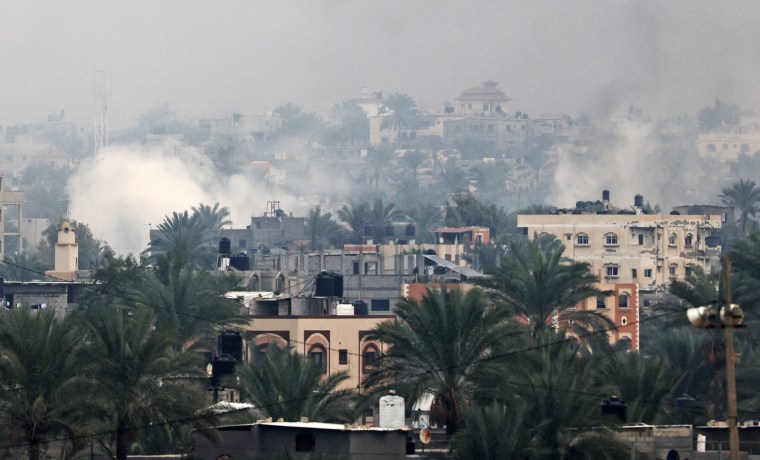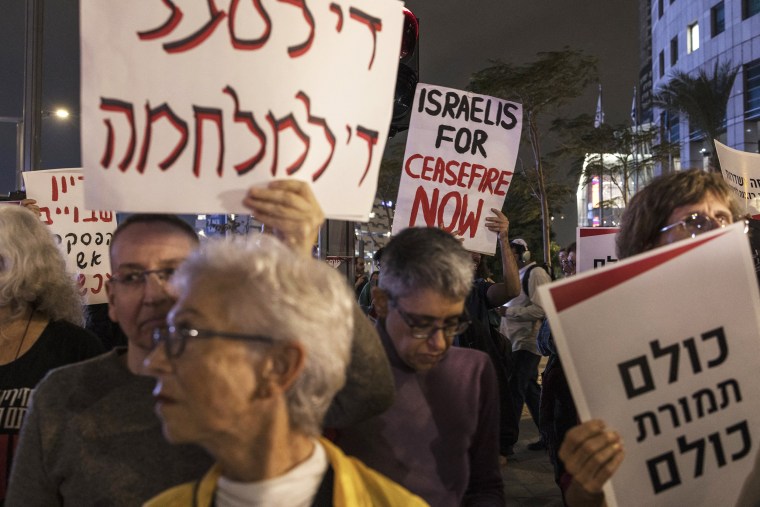TEL AVIV — A meeting between the families of those still being held by Hamas and Israeli Prime Minister Benjamin Netanyahu’s war Cabinet became “chaotic” as arguments erupted over the best way to free the remaining hostages, one participant told NBC News.
As Israel expands its assault on southern Gaza, tensions soared as attendees, including people who were recently freed by the militant group, disagreed with both the government and one another over the negotiations to free more of their loved ones, said the participant, who was not authorized to speak publicly about the meeting on Tuesday.
Less than 24 hours later, a group representing the families released a letter demanding that the government reach a deal for the immediate release of their family members, a sign of their mounting dismay at the apparent decision to prioritize the military campaign over their relatives’ well-being.
There were also heated debates over which hostages should be given priority for release — young women, the elderly or military aged men — the participant said, adding that, at one point, one family member held up an hourglass to emphasize that “time is running out.”

Recordings of the meeting leaked to multiple Israel media outlets and verified by NBC News captured the tensions in the room.
One woman, identified as a recently released hostage, said her husband, who is still being held in Gaza, was punching himself in the face because he could not stand the conditions he was living in.
Accusing the government of putting politics over the hostages’ return, her voice shaking, she said, “All you’re thinking about is collapsing Hamas,” adding, “Give them back whoever they want and bring everybody back.”
In a separate recording, another freed hostage accused Netanyahu of playing “roulette with their lives,” as she called for the release of more Palestinian prisoners in order to free the remaining Israel hostages.
Hamas and other militants seized around 247 hostages during their deadly Oct. 7 attack on southern Israel, which left around 1,200 people dead. In return Israel pummeled the Gaza Strip, killing at least 15,000 people, many of them women and children, according to health authorities in the enclave, which is controlled by Hamas.
Throughout the military campaign, Netanyahu has been notably absent from public view as his military chiefs give daily news conferences. His poll ratings have also slumped as many blame him for failing to protect Israel from Hamas’ assault.
While a weeklong cease-fire led to the exchange of dozens of hostages held by Hamas for scores of Palestinian prisoners held by Israel, fighting resumed after the truce gave way Friday, dealing a blow to the families of those remaining in captivity.

Ruby Chen, whose 19-year-old son, Itay, was working for the Israeli military when he was taken captive, attended Wednesday’s meeting with Netanyahu and his war Cabinet.
“Tensions were high,” Chen, 55, said, adding that the Cabinet members told the families that the Israeli government had “no one to negotiate with.”
“The Israeli government claims that we need to go back to the military option [and] wait until Hamas comes back to talk to us. I don’t think that’s correct,” he said. “I think that today, if you put an offer on the table, someone will listen.”
He added that there was someone to negotiate with last week, “so what has changed?”
“The only thing that has changed is that the Israeli war Cabinet has decided that it doesn’t want to negotiate, for whatever reason,” he said.
In a statement issued after the meeting, Netanyahu said he fully shared “the deep concern of the families whose loved ones are still being held in Gaza.” He added that the government is working to bring home all hostages, “male and female soldiers, male and female civilians, young and old, everyone, without exception.”
His statement appeared to pass little muster with the Hostages and Missing Persons Families Forum, a campaign group that has hosted news conferences, briefed journalists and met with President Joe Biden and other world leaders.
After the meeting the group released what it said were direct quotes from hostages at the meeting, although it did not attribute them directly to individuals. One said they thought they were going to die and “wanted to be shot.” Another told the group that Hamas “shaved off all of dad’s body hair to humiliate him.”
Then on Wednesday, the group sent a pointed letter to the Israeli war Cabinet.
It quoted professor Hagai Levine, doctor who is leading the forum’s medical team, as saying there was “solid intelligence that there are hostages whose condition has deteriorated and who are now in immediate danger of life due to untreated injuries or illnesses.”
Levine added that at least a third of the hostages have “previous illnesses that require treatment,” while others suffered serious injuries in the Oct. 7 attack, including gunshot wounds, amputations and “shrapnel penetration.”
After 61 days, the Israeli government says 138 hostages are still being held in Gaza, 20 of them women and 10 over the age of 75.
Asked if the Israeli government would consider offering rewards or amnesty if the groups holding hostages released them, government spokesman Eylon Levy rejected the idea, saying, “Our strategy at the moment to get the hostages home is based on unrelenting military pressure on Hamas.”
It was not the response Chen was hoping for, and he had a warning for his country’s leaders.
“We are telling the Israeli government: ‘You think you have a chance to stay in power? You start negotiating now,’” he said. “It’s not just that we don’t have any time; the Israeli people that are behind the families will understand that they’re being played. The war Cabinet, each and every one of them, needs to understand.”
Gabe Joselow reported from Tel Aviv, and Daniel Arkin from New York.


